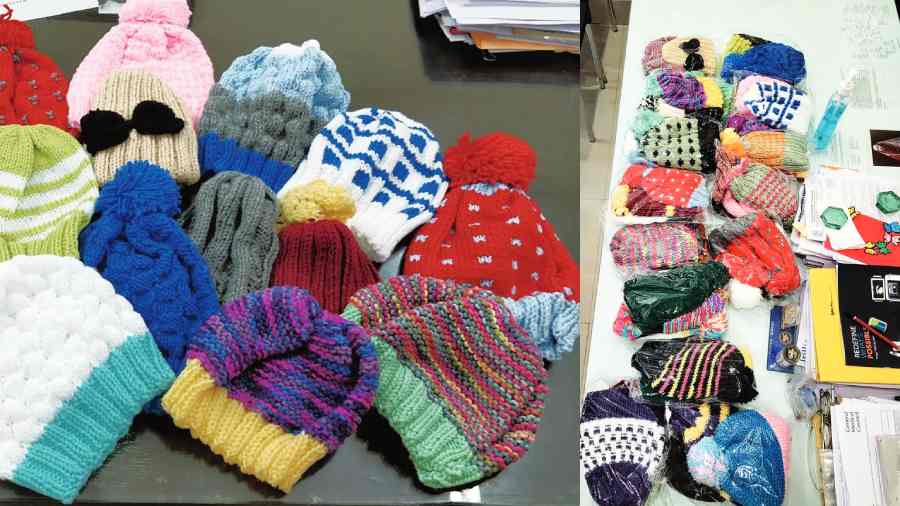An endocrinologist in the US has knitted woollen caps for children with cancer and sent them to a hospital in the city where kids live for months for treatment.
Meera Menon, who did her MBBS from Calcutta National Medical College, now lives in Arizona. She moved to the US in 1995.
Menon took time out of her schedule to knit colourful woollen caps for the children, many of whom lose their hair after chemotherapy.
Doctors said that in Kolkata, there were no separate departments in hospitals where counselling was done for the mental trauma faced by cancer patients.
Counselling on losing hair or other physiological changes is an essential part of the treatment in the US or other countries, they said.
Menon has sent around 50 caps for the children undergoing treatment at Saroj Gupta Cancer Center & Research Institute to put her hobby to good use, she said.
“It would have been much easier to buy caps but I wanted to make it for the children. It is something very small but I wanted to do something and children are attracted to colours,” Menon told The Telegraph over the phone.
“It takes me three to four days to make a cap and so, it took some time,” she said.
The cancer hospital in Thakurpukur has about 40 children undergoing treatment.
Usually, on an average, children stay at the hospital for six months to undergo treatment.
“For children with leukaemia, there has to be comprehensive treatment for six months for which they have to stay. Otherwise, it could lead to infection,” said Arnab Gupta, director, Saroj Gupta Cancer Center & Research Institute.
Most of the children are from marginalised families of rural Bengal and are treated at subsidised rates at the Thakurpukur hospital.
“It is a sensitive gesture for someone in the US to give a thought to the children here,” said Gupta.
Gupta said that while treating children with cancer, one has to think not only about the child but also counsel the parents to help them cope.
Doctors and psychologists said that in most cases, cancer patients lose their hair or undergo other changes in their bodies for which they have to counselled.
“We do talk a lot about the quality of life but when people lose their hair little is done except for telling them that it will grow back with time,” said surgical oncologist Gautam Mukhopadhyay.
“We can give good treatment but for quality of life, we need assistance. Young and dynamic fashion designers should come forward to address this.”
Mukhopadhyay said that doctors ask patients to wear wigs but professional intervention was required to make the wigs look more real.
“When people lose their hair because of chemotherapy and they go out into the market or public place, people become inquisitive. That worsens the quality of life of the person with cancer,” Mukhopadhyay said.
Kasturi Mukherjee, a psychologist who counsels patients with cancer, said that losing hair becomes a cause of concern for patients because it is visible.
“The cancer patient could be undergoing other problems like loss of appetite or vomiting but those are not outwardly visible. Statistically, not everyone loses hair but some are in anxiety from the apprehension of losing their hair,” said Mukherjee.
Counselling and “pyscho education” of the patient and the family members helps them have all the information to help them think rationally, she said.
